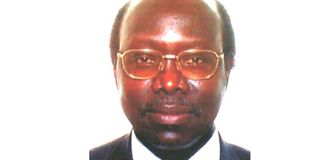On the challenge of writing well

Harold Acemah
What you need to know:
- As a former visiting fellow at Oxford University, I know for a fact that the British don’t have a magic wand which can rid Uganda of absurdity, mediocrity and tyranny!
- The tragedy of Uganda is that since 1986, the ruling elite has poisoned the minds of Ugandan youth by attempting to rewrite the history of Uganda.
Today’s column is a critique of Timothy Kalyegira’s perspective titled ‘The importance of good writing’ published in the Sunday Monitor of April 30 in which the author laments about why the British, whom he admires, rushed to grant independence to Uganda in 1962 instead of perhaps doing what they did in India where British colonial rule lasted almost 300 years!
It is pathetic and mind-boggling to witness an African longing for colonialism in the 21st Century! I guess for him, compared to the corrupt, decadent and violent elite who have held Uganda hostage for more than 30 years; British colonialism was relatively efficient and humane.
“Reading these books rubs salt into my wounds and reminds me of just how much Uganda lost in the ill-advised rush to independence in 1962. What was the rush for? What was impatience for?” bemoans Kalyegira.
For Kalyegira’s information, colonialism had by mid-1950s ceased to be fashionable and was, in fact, an embarrassment. At the instigation of Kwame Nkrumah of Ghana and other non-aligned leaders of his time, the UN General Assembly adopted in1960 a landmark resolution titled, “Declaration on the Granting of Independence to Colonial Countries and Peoples” which effectively sealed the fate of colonialism.
As a result, several African countries achieved independence in early 1960s, e.g., DR Congo and Nigeria (1960); Tanganyika (1961); Uganda, Rwanda and Burundi (1962) and Kenya (1963). Granting uhuru was good riddance for the British and French, but they did not exactly pack all their bags and go back to London or Paris.
While Portugal and Spain resisted the tide of history until 1975, old-style colonialism mutated into what Nkrumah called “neo-colonialism” which is alive and kicking, even here in Uganda!
Kalyegira writes, “Right now I am reading through a booklet titled, ‘The First Five-Year Development Plan, 1961/62-1965/66’ published in July 1962.”
It was your columnist who opened Kalyegira’s eyes to Uganda’s second five-year development plan of 1967-1972 which prompted him search for the first plan which I am glad has impressed him. I speculated that, if the reactionary and foreign-inspired military coup of 1971 did not take place, Uganda would have been a middle-income country long ago!
Never mind the empty and laughable slogan spewed by some leaders that Uganda will achieve middle income status by 2020; that is wishful thinking designed to deceive wananchi.
Kalyegira concludes with a bizarre proposal; “What the British government should do instead is send Uganda at least 1,000 Britons to work as teachers, civil servants and academics in various towns and institutions in Uganda. That is where the need is greatest, the need for people gifted with writing skills, analytical minds and that ability to write reports that lend clarity to important national issues.”
I sympathise with Kalyegira for sounding disillusioned and frustrated with the horrendous situation in Uganda. A regular commentator on my opinions, Dr Geoffrey Buga, whose views I respect, put Kalyegira’s dilemma aptly. “I appreciate Kalyegira’s impatience with the current mediocrity that passes for development engendered by the hapless NRM,” he wrote.
As a former visiting fellow at Oxford University, I know for a fact that the British don’t have a magic wand which can rid Uganda of absurdity, mediocrity and tyranny!
The tragedy of Uganda is that since 1986, the ruling elite has poisoned the minds of Ugandan youth by attempting to rewrite the history of Uganda; many young people have been misled to believe that nothing good happened in Uganda before NRA guerrillas grabbed power on January 25, 1986, which coincided with the day Gen Idi Amin staged a military coup in 1971. Could it be a case of birds of the same feather flocking together?
Uganda has many capable people
There are thousands of Ugandans who have the ability and skills Kalyegira thinks only the British possess. Most have sadly been locked out of the public sector because they either don’t come from the few favoured tribes or do not support one-man rule.
Kalyegira should visit government archives at Wandegeya or Ministry of Foreign Affairs headquarters to read hundreds of first class reports written by Ugandans in the 1960s, 1970s and 1980s when meritocracy mattered. Below are a few outstanding civil servants who served Uganda with distinction.
Frank Kalimuzo, who was permanent secretary and head of the civil service in the 1960s and was appointed by former president Milton Obote as the first vice chancellor of Makerere University in 1970; Z. Bigirwenkya who was permanent secretary, Ministry of Foreign Affairs and first secretary general of the original EAC in 1967; Samwiri Sserwanja who was secretary for establishments; Sam Baingana, Paul Etiang, Akisoferi Ogola, Francis Gureme, Ben Dramadri, Peter Ucanda, Daudi Taliwaku, Cyprian Ajiku, Martin Lagara and many others.
On a personal note, one of the finest medical doctors I know is a Ugandan called Dr Muniini Mulera who saved my son Emmanuel’s life in 1989 in Toronto after some incompetent bazungu doctors gave wrong diagnosis.
There are thousands of exceptional Ugandan doctors, engineers, teachers, lawyers, etc. who are stuck abroad because of the hostile political environment in Uganda. What a shame! What a disgrace!
Mr Acemah is a political scientist, consultant and a retired career diplomat. [email protected]




